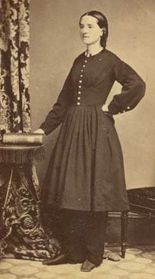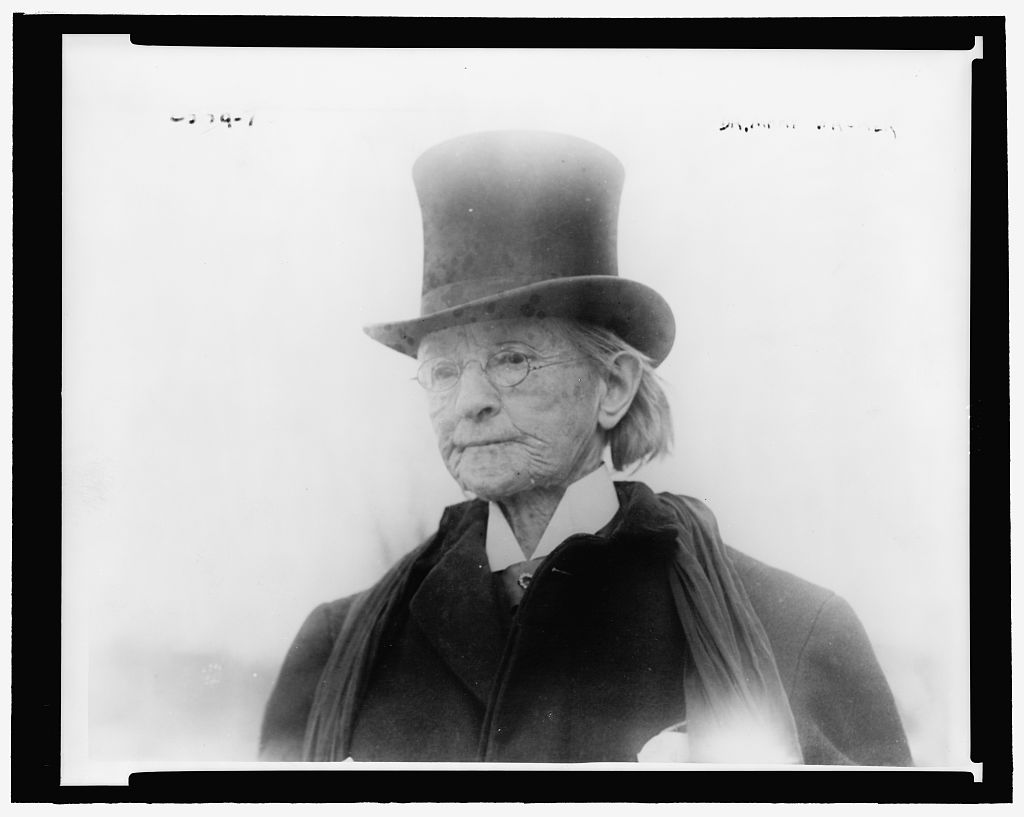By the time the Civil War broke out, Walker had already experienced the ups and downs of life. She graduated from Syracuse Medical School in Syracuse, New York in 1855. She had married, set up a private practice, closed that same private practice, and divorced her husband. She had embraced the idea of dress reform, raising eyebrows and eliciting whispers because of her decision to avoid the constricting, uncomfortable and unhealthy clothing women were expected to wear—long skirts, petticoats, and corsets—instead dressing in men’s pants and suspenders worn under short dresses. As the country mobilized after President Lincoln’s call for 75,000 volunteers to suppress the Confederate rebellion, Dr. Walker tried to join the army, but much like society at large, the United States Army was skeptical of the skills of a female surgeon. Instead, Mary volunteered her time as a nurse, bandaging wounds, comforting the sick and wounded, writing letters for soldiers who couldn’t do so themselves. Near Washington, D.C. as the first battle of the Civil War got underway just miles outside of town near Bull Run Creek, she worked in a field hospital caring for the battle’s Union wounded. She later worked at the Patent Office Hospital, served as an unpaid field surgeon after the Union defeat at Fredericksburg and in Chattanooga after the Union defeat at Chickamauga. Though the Army wouldn’t enlist her, they finally began to employ her as a contracted (civilian) Assistant Surgeon for the Army of the Cumberland. She would later be appointed Assistant Surgeon of the 52nd Ohio Infantry Regiment. On April 10, 1864, she had just finished assisting a Confederate surgeon with an amputation, when Confederate troops captured her in neutral territory and accused her of spying. Dr. Walker was transported to Castle Thunder, a prisoner of war camp in Richmond, Virginia, where she spent the next four months. Her dress, which allowed her the freedom of movement necessary to perform her duties as an army surgeon, was especially conspicuous in Castle Thunder and brought ridicule in the Richmond newspapers, including the Richmond Sentinel, which reported in its April 22, 1864 edition, “Female Yankee Surgeon--The female Yankee surgeon captured by our pickets a short time since, in the neighborhood of the army of Tennessee, was received in this city yesterday evening, and sent to the Castle in charge of a detective. Her appearance on the street in full male costume, with the exception of a gipsey hat, created quite an excitement amongst the idle negroes and boys who followed and surrounded her. She gave her name as Dr. Mary E. Walker, and declared that she had been captured on neutral ground. She was dressed in black pants and black or dark talma or paletot. She was consigned to the female ward of Castle Thunder, there being no accommodations at the Libby for prisoners of her sex. We must not omit to add that she is ugly and skinny, and apparently above thirty years of age.” She was finally exchanged, surgeon for surgeon, on August 12, 1864. She returned to her service and was given charge of female prisoners in a Kentucky prison and later a Tennessee orphanage. After the war, Generals William Tecumseh Sherman and George Thomas recommended Dr. Walker for the Medal of Honor and on November 11, 1865, President Andrew Johnson signed the order awarding her the Army’s highest honor even though she had served as a civilian. Whereas it appears from official reports that Dr. Mary E. Walker, a graduate of medicine, "has rendered valuable service to the Government, and her efforts have been earnest and untiring in a variety of ways," and that she was assigned to duty and served as an assistant surgeon in charge of female prisoners at Louisville, Ky., upon the recommendation of Major-Generals Sherman and Thomas, and faithfully served as contract surgeon in the service of the United States, and has devoted herself with much patriotic zeal to the sick and wounded soldiers, both in the field and hospitals, to the detriment of her own health, and has also endured hardships as a prisoner of war four months in a Southern prison while acting as contract surgeon; and Whereas by reason of her not being a commissioned officer in the military service, a brevet or honorary rank cannot, under existing laws, be conferred upon her; and Whereas in the opinion of the President an honorable recognition of her services and sufferings should be made. It is ordered, That a testimonial thereof shall be hereby made and given to the said Dr. Mary E. Walker, and that the usual medal of honor for meritorious services be given her.
0 Comments
Leave a Reply. |
AuthorToni is a wife, mom and history buff who loves bringing the Civil War to life for family members of all ages. Archives
July 2018
Categories
All
|


 RSS Feed
RSS Feed